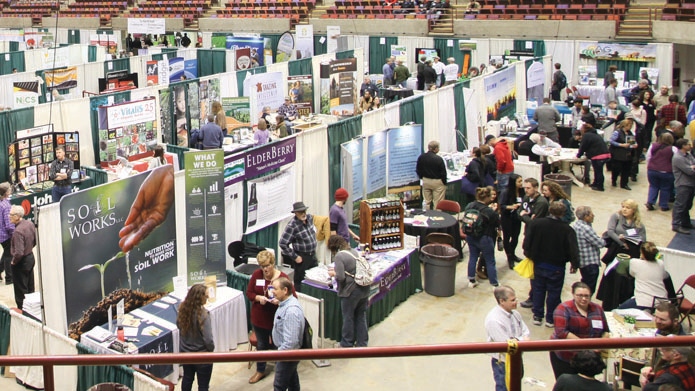December 3, 2019

Early registration just opened for the country’s largest conference about organic and sustainable agriculture. The 31st Annual MOSES Organic Farming Conference takes place Feb. 27-29, 2020, in La Crosse, Wisconsin. The event brings together farmers, researchers, and agriculture professionals to learn the latest organic production practices and build a supportive community of resilient organic, sustainable, and regenerative farms.
The conference, organized by the Midwest Organic and Sustainable Education Service, features 60 workshops over six sessions, 10 full-day classes, a two-floor trade show, organic meals, and round-table discussions plus more opportunities to network. Nearly 3,000 people are expected at the conference.
Emily Fowell, a farmer from Westby, Wisconsin, who has been to the MOSES Conference the last three years, has found it to be “absolutely packed with useful and applicable information from beginning to end. There are so many things I can take right back to the farm!”
Tim Daley, an agronomist with Stonebridge LTD, has attended the conference 23 years running. Stonebridge, a grain marketing firm in Cedar Falls, Iowa, is a conference sponsor and has a booth in the large trade show. “It's the best conference out there,” Daley said of his experience at the MOSES Conference.
The three-day event starts Thursday, Feb. 27 with in-depth Organic University classes running from 10 a.m. to 5:30 p.m. The 10 classes are:
Conservation Programs to Support Organic Farms
Financial Impact of Organic Grain Transition
Healthy Small Ruminants
Highs and Lows of Growing CBD Hemp
Five Steps to a Fair Farm
Manage Your High Tunnels for Long-Term Success
Managed Grazing for Healthier Dairy and Beef Herds
Rotations for Reduced Tillage and Resilience
Start a Producer-Owned Cooperative
Strategies for Successful Organic Tree-Fruit Production in the Midwest
“Conservation Programs to Support Organic Farms” has been designed to help both farmers and agriculture professionals pair valuable programs with the work they’re doing on the land. In “Financial Impact of Organic Grain Transition,” corn and soybean farmers who’ve been considering the switch to organic will learn about the organic grain market and tools they can use to pencil out potential profits and prepare for a smooth transition. OrganicUniversity.org lists details about all the classes.
The trade show opens the evening of Feb. 27 and runs through Feb. 29. It features more than 170 vendors—buyers, suppliers, and organizations offering services that support farmers. Admission to the trade show is included with conference registration.
Leah Penniman, the author of Farming While Black, gives the keynote Feb. 28. She has been a soil steward and food sovereignty activist for more than 20 years. John Ikerd presents the keynote Feb. 29. He is a visionary economist, educator, and author, whose life work has focused on family-scale farms that protect the natural ecosystem, nurture rural communities, and provide livelihoods for farmers.
Early Bird registration for the full conference is $210 through Jan. 7; on-site price is $300. Discounts on single-day tickets also are available through Jan. 7. See mosesorganic.org/conference for registration information, workshop descriptions, and more details. To request a 20-page conference guide with a mail-in registration form, call 888-90-MOSES.
MOSES is a nonprofit organization that supports organic and sustainable agriculture by providing education, resources, and practical advice to help farmers succeed.
You May Also Like




